
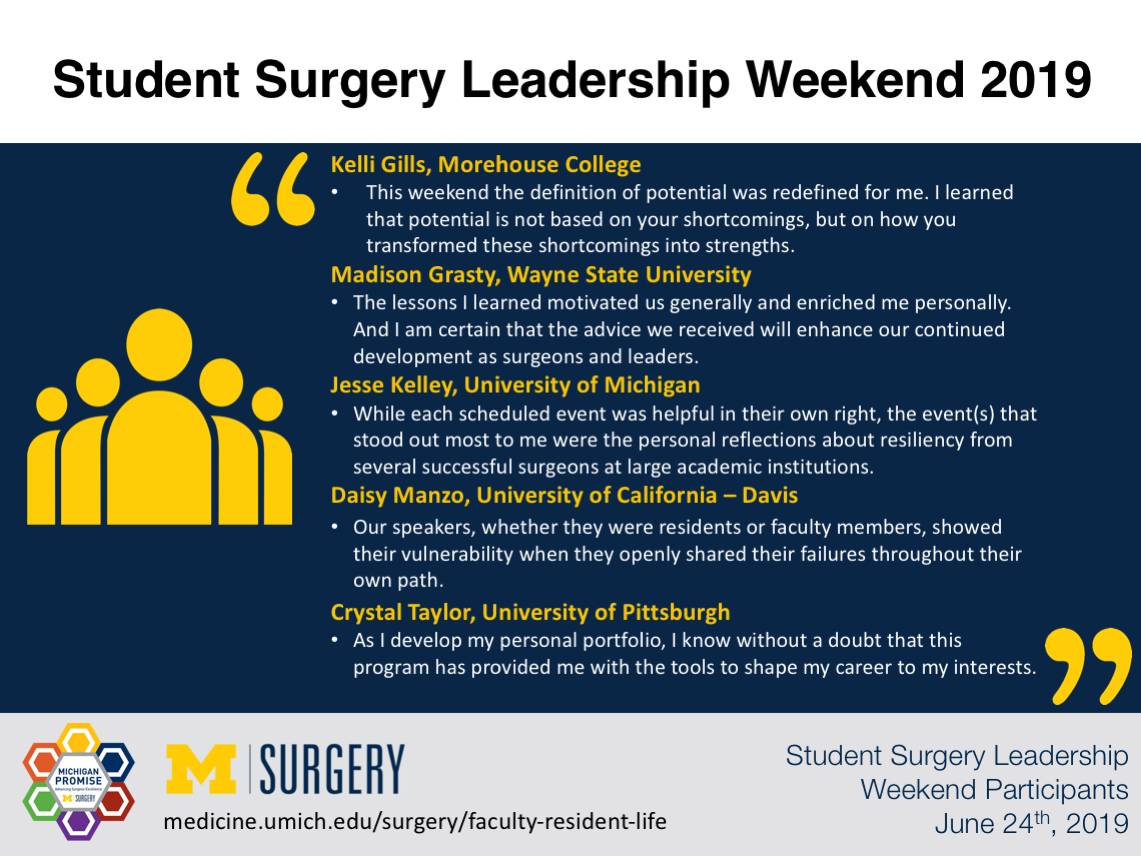
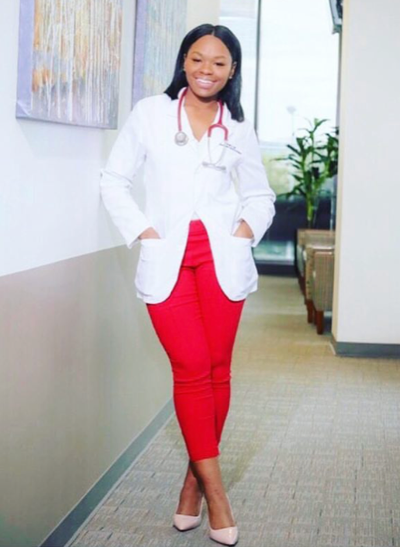
Kelli Gills
My name is Kelli Gills and I am an upcoming 4th year medical student at Morehouse School of Medicine in Atlanta, GA. As I walked into the “Big House”, nervous yet excited, I saw children running on the field and couldn’t help but wonder what other event they had taking place. It wasn’t until I reached the Regency Lounge that I realized this was the family and children of Michigan Medicine surgeons. I observed and admired the genuine interactions between the faculty and families. The first night of the Surgery Leadership Conference showed me that this was a program that represented community, and valued family. Growing up on the Southside of Chicago, community and family was a lifeline. As a young girl I lost many friends, six to be exact, and community members to violence. I knew I wanted to save the lives of those suffering from acute trauma and physical vulnerability, giving others a second chance at life. However, I did not believe that I had the potential. This weekend the definition of potential was redefined for me. I learned that potential is not based on your shortcomings, but on how you transformed these shortcomings into strengths. The topic of the Surgery Leadership conference was “Grit and Resiliency”. One of the leaders in surgery described resilience as maintaining one’s core purpose despite hardships. It was this discussion that helped me realize that traumatic experiences instilled in me resiliency, shaping me into the medical student that I am today. I learned that the failure I had to overcome, aligned me in the exact position I needed to be. I learned that I have to own my narrative, own my adversities, and express my vision. Most importantly, I learned that “everything will be alright in the end, and if it isn’t alright, then it isn’t the end”. Resilience is the key to future success as a surgeon. This weekend was truly inspirational. I’m so thankful to have been invited to engage with fellow future leaders, while learning from the pioneers in academic surgery and leadership.
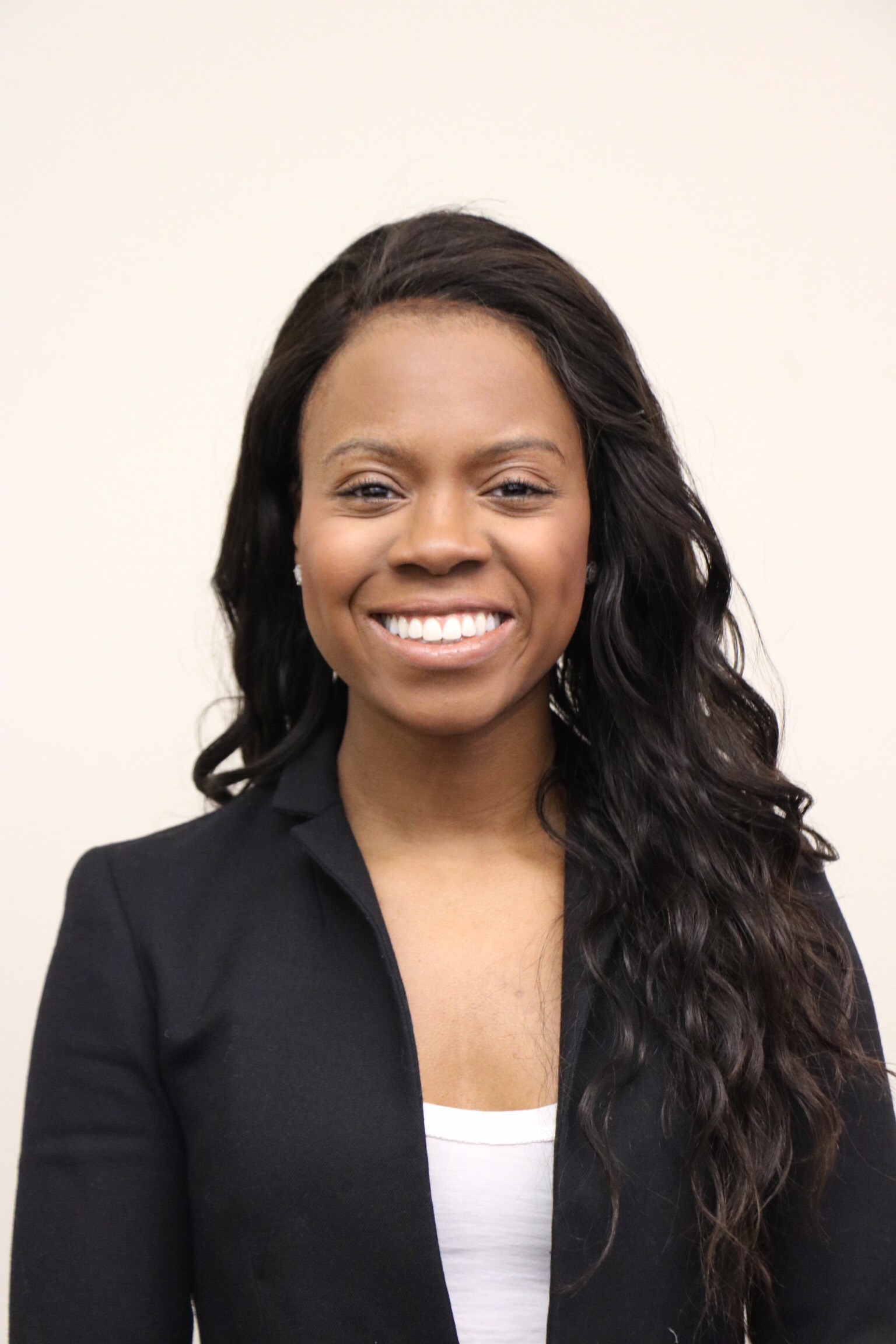
Madison Grasty
As a medical student, we spend a great deal of time learning the pertinent pathophysiology, pharmacology and ethical standards required to treat patients. However, during my clinical years I discovered that excellent surgical skills demand more than a large knowledge base, but also entail empathy, clinical judgment, and cooperation. During the Leadership Weekend, I learned further that surgery calls for one additional quality: resilience, which is defined as being “able to withstand or recover quickly from difficult conditions”.
Prior to this engagement, I thought of resilience as a quality required by someone who competes in a tough-mudder competition, but I began to understand the importance of this characteristic for an academic surgeon. Dr. Dossett opened our eyes to the necessity of adaptation as a way of equipping ourselves to bend and rebound from adversity rather than be broken by it. We were reminded by Dr. Dossett that although having a manuscript rejected or not matching in the fellowship of one’s dreams can be devastating, embracing such disappointments with faith and purposeful resolve can lead to unexpected, exciting alternatives. Dr. Dimick reminded us further that we must search for what makes us unique and utilize “our golden nugget” to improve the functionality and cohesiveness of the teams of which we will eventually become a part. Lastly, Dr. Brown reminded us of our responsibility to foster diversity since it leads to a richer, more creative problem-solving environment.
The Leadership weekend is something I will always remember. The lessons I learned motivated us generally and enriched me personally. And I am certain that the advice we received will enhance our continued development as surgeons and leaders.
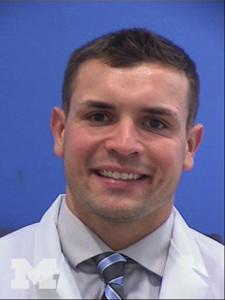
Jesse Kelley
Leadership development has recently entered the spotlight in medical facilities across the nation. Prior to this cultural change, a physician functioned independently and was solely a leader of him- or herself. Today, physicians are expected to lead and function well within a multi-disciplinary team. Excellent patient care demands it.
The Student Surgery Leadership Weekend has been an event that I always looked forward to attending during my medical school training. As I sit back and reflect, I cannot help but be grateful for the opportunity to meet various medical students from around the country who share a common interest: to become better leaders for themselves, their patients, and their teams.
While each scheduled event was helpful in their own right, the event(s) that stood out most to me were the personal reflections about resiliency from several successful surgeons at large academic institutions. Several speakers shared stories of the various hardships that they have faced throughout their career. I took away three lessons from these sessions: 1) even the most successful surgeons have stumbled occasionally throughout their career 2) we need to surround ourselves with a team that will be there for us when we face adversity, and 3) failure is not a measure of character; it is an opportunity for personal and professional growth.
As fourth year medical students who are quickly approaching residency training, we will inevitably face adversity that will challenge our resiliency. Knowing that successful leaders within the surgical field have had similar experiences throughout their training will help us as we progress through ours. Adversity should be viewed as an opportunity for personal and professional development, and we need to surround ourselves with a support team who will help remind us of such. The success and well-being of our future team depends on it.
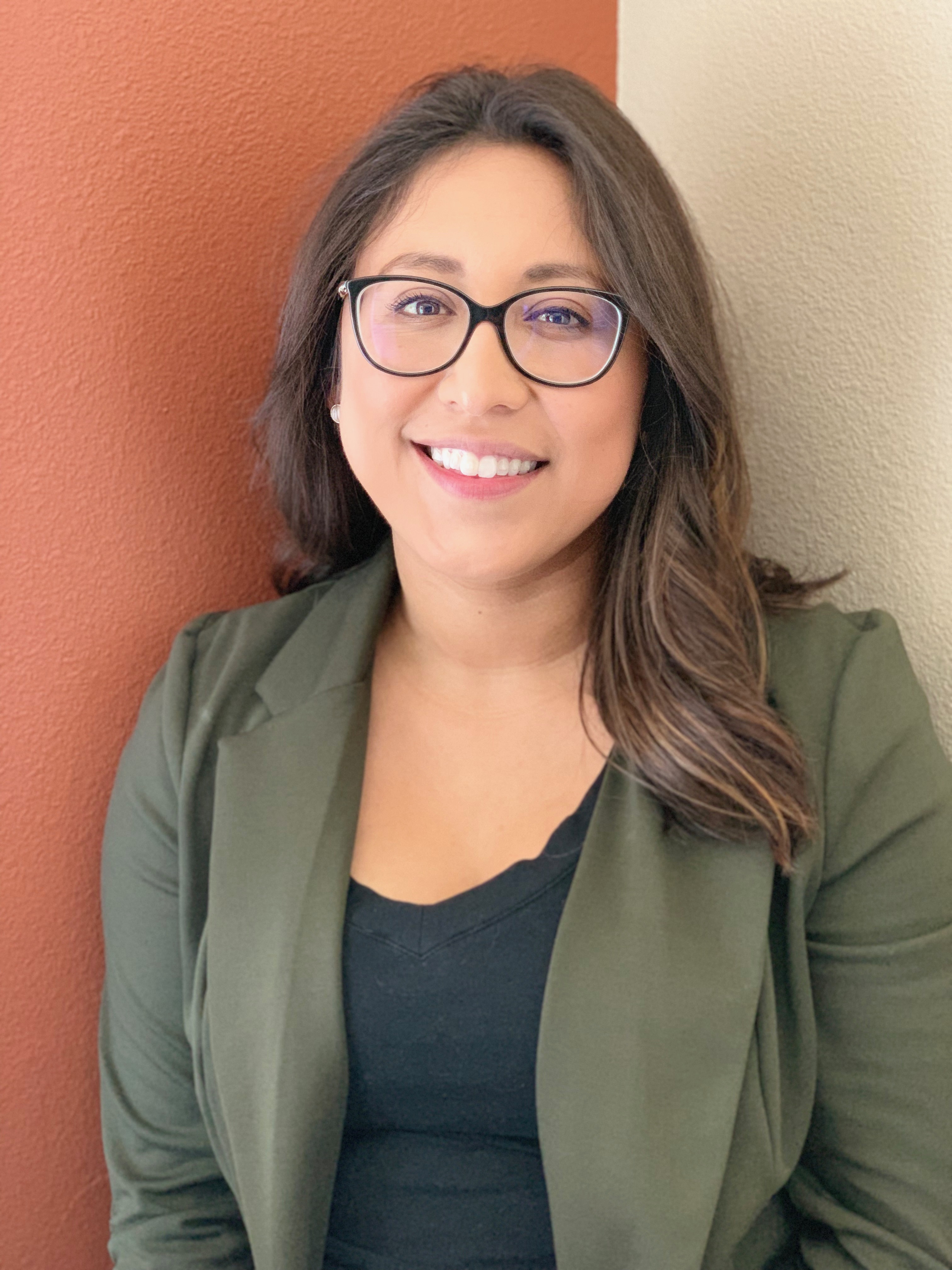
Daisy Manzo
My name is Daisy Manzo, a fourth-year medical student at the University of California, Davis, preparing to pursue a career in general surgery.
This field of medicine had the perfect combination of hands-on skills and patient care I looked for in a specialty, however as someone who is from the Central Valley of California, access to surgeons is limited; Spanish-speaking Latina surgeons are even more scarce. Increasing diversity in healthcare has been my passion as my own experiences with the healthcare system has proven time and time again that the lack of culturally competent physicians plays an immense part in the wellbeing of underserved communities.
I had the privilege of attending the Student Surgery Leadership Weekend at the University of Michigan. I left that weekend more eager to pursue this path. I was thankful for the opportunity to be brought together with other likeminded students from other universities who each had unique perspectives and conversations to bring to the table. It was clear to see the importance the University of Michigan places on fostering diverse communities simply by observing those around me.
We participated in an interactive activity that allowed us to witness the variety of personalities that lies even within the same specialty, but most importantly it reemphasized the need of individuals who may not necessarily view things the same way you do. On the contrary, the combination of people with different views makes a team even more valuable and successful.
We were honored to have our keynote speaker Dr. Rebecca Minter, Surgery Chair of the University of Wisconsin and previous faculty at the University of Michigan. She is the prime example of who I inspire to be. As a female, I have had an internal struggle of how I could possibly balance a career, continue my community work and start a family. However, she made it known that anything is possible if you put in the work and dedication. She was an inspirational woman who has attained great success while all in all still being able to have a loving family; she even had her son accompany her during this weekend which made her even more admirable. I appreciated the honesty about her struggles throughout her path. That was a common theme throughout the weekend. Our speakers, whether they were residents or faculty members, showed their vulnerability when they openly shared their failures throughout their own path. Their honesty made them even more relatable especially hearing that they still attained their goals despite all obstacles. Resilience truly is the key as we venture through this rigorous career. And as it was reiterated countless of times during the weekend, we will continue to need guidance from mentors during all stages of our profession.
I had the pleasure of meeting Dr. Jonathan Finks at the Diversity in Medicine conference hosted by Michigan a few months prior to this weekend. We shared our mutual interests in pipeline programs for youth and I immediately knew he would be someone worth getting to know. I was pleased to be able to reconnect with him at this weekend because it is people like him who give students like me the opportunity that many from my background do not have.
I am excited to embark in this career towards academic medicine. I am even more excited to continue to learn more about institutions such as the University of Michigan who are committed to increasing diversity in the healthcare workforce. I only hope to one day be a champion in such institution to keep working towards our common goal.
Crystal Taylor
The University of Michigan Student Surgery Leadership Weekend went above and beyond my expectations! I had the privilege of meeting some of the wonderful residents and faculty at the University of Michigan Department of Surgery and listen to engaging presentations about the various paths taken through the field of academic surgery. I truly enjoyed participating in various team building exercises with other student participants as I realized we had many more similarities than differences. I learned that although one may strive for perfection, there will always be some areas for improvement. More importantly, it is ok to ask for help from someone who may be stronger than you in a particular area and you can both learn from each other.
The theme of resiliency which was discussed this year is more than just a concept; it is the ability to not only withstand adversity, but to be able to adapt to new obstacles and incorporate those lessons into a comprehensive toolkit that is readily available at one’s disposal. I was given time to self-reflect on my core values and to identify qualities of a residency program that are most important to me as I begin the application process for this upcoming cycle. I was awe-inspired and reinvigorated to pursue a career as an academic surgeon. As I develop my personal portfolio, I know without a doubt that this program has provided me with the tools to shape my career to my interests. The University of Michigan is committed to cultivating and nurturing the ideas of its residents and faculty. It was clearly evident from this weekend that this is an inclusive environment where all ideas are welcomed. I am honored to have participated in this program and am a believer of the Michigan Promise.
Downloads
Contact Us
Reach out to join the conversation or to learn more about how to implement the Michigan Promise. Connect with the Department of Surgery or our faculty on Twitter to share your ideas or get in touch with the Office of Faculty & Resident Life to schedule a Michigan Promise presentation at your institution. You can also fill out our Michigan Promise Inquiry Form with any questions or comments.
Department of Surgery
2210F Taubman Center
1500 E. Medical Center Dr.
Ann Arbor, MI 48109
Phone: 734-232-5528
Email: [email protected]
Twitter: @UMichSurgery
Hashtag: #MichiganPromise
